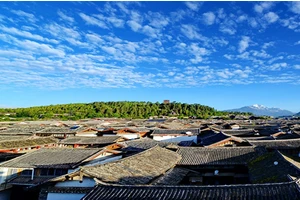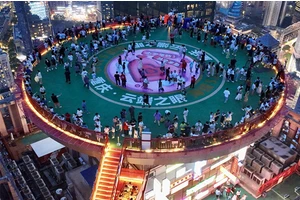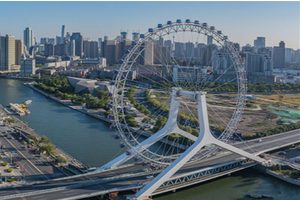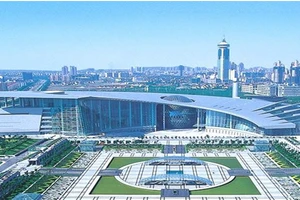A thesis on China's tourism culture
Historical Authenticity of Tourism Culture
(A) Tourism culture contains real history and culture. The glyph of Li (e) in Oracle Bone Inscriptions and inscriptions on bronze is just a foot, indicating that people walk through the Woods. In "Shuo Wen Jie Zi" written by Xu Shen in the Han Dynasty, he said: "Calendar, passing, and passing." "Culture is a complex whole, including knowledge, art, religion, myths, laws, customs and other social phenomena." (IB Taylor, UK) As a kind of history and culture, tourism culture should be "true", which is an objective fact. It is not the history fabricated and tampered with by a few "foreign experts" and "local authorities". In this "silk road starting point" debate. Cai Yunzhang, member of the Henan Provincial Cultural Relics Appraisal Committee and director of the Institute of Yi Studies and Archaeology of Henan University, found evidence in the ancient book Biography of Mu Tianzi: In the Western Zhou Dynasty, Mu Tianzi set out from Luoyang and traveled westward to Kunlun Mountain to meet the Queen Mother of the West. This legendary "evidence" can only be a legend, and the author believes that it cannot constitute a real scene of history and culture. There are many ways to obtain the authenticity of history, especially the Silk Road, which is a tourism product (tourism resource) involving meteorology, religion, trade and art, should be scientifically judged by using modern archaeological methods, and its authenticity can be restored by looking for historical materials in many ways and demonstrating them in many ways.
(2) The authenticity of tourism culture is also relative. It is impossible to completely restore the Silk Road. When studying, we should be as considerate as possible at this stage. Before Zhang Qian went to the Western Regions, there were also bits and pieces of silk materials to go. Mr. Cai Yunzhang believes that the Silk Road was opened long before Zhang Qian went to the Western Regions. During the Shang Dynasty, there was a "Jade Road" from the Central Plains to the Western Regions. Many jades unearthed in the tombs of the rich in Yinxu, Anyang and some rich in Luoyang were Hetian jade from Xinjiang. In fact, during the Shangzhou period, until Zhang Qian's mission, the west of Chang 'an was a wild land, which the Han Dynasty was indifferent to, and even had plans to give up Liangzhou. When we study problems, we should use a philosophical point of view, and we should distinguish between primary and secondary contradictions and the relationship between the main and secondary aspects of contradictions. To study the "Silk Road", we must first determine the connotation and extension of its historical concept. Only Zhang Qian is the representative of the sovereign state of the Han government to the Western Regions, which is one of them. Academic circles agree that the study of the starting and ending time and route of the Silk Road has been conclusive, so it is necessary to conduct in-depth research in this category, which is the second. There are three land routes along the Silk Road, which have evolved in history, but there should be a recognized definition. Of course, we should not oppose historical doubts and scrutiny, but any kind of subversion must be based on evidence. Therefore, the authenticity of tourism culture is relative, and the best combination of tourism, history and culture should be considered. Only in this way can the research be of value and significance. Some archaeological things are limited to the historical category, and they should have a choice in the role of tourism culture. After careful consideration,At present, China experts focus on advocating that the time of Zhang Qian's mission to the western regions should be taken as the starting point and the mid-Qing Dynasty as the end point, which was basically accepted by countries along Central Asia at the "Xinjiang Conference".
(3) The historical authenticity of tourism culture also lies in its "authenticity" not being distorted by the government and its media. For political purposes, economic consciousness or to cater to a certain viewpoint and theory, the government leads propaganda and media bombing, which causes the historical authenticity of tourism culture to fade or change its flavor in the process of experience and communication. Xi 'an and Luoyang media reports are biased and lack a "neutral" position, which may be to create a "selling point" of news. But it is a bit "disastrous for the country and the people, delaying future generations." Luoyang media deliberately tampered with the expression of the Preliminary Action Plan at the "Xinjiang Conference", and this "black humor" goes against professional conscience.
The subject of tourism culture needs real historical culture psychologically, and tourism culture, as an academic discussion, should not raise folk investigation to academic basis. The tourist object should reflect the objective history and culture, and the tourist culture media need to master and understand the true, accurate and latest history and culture. We should respect the historical authenticity of tourism culture, trace back to the source, and endow it with an objective and true historical sense, so as to develop the tourism culture of the local, regional and ethnic groups.
The marketability of tourism culture
(1) Tourism culture, as the sum of all kinds of relations among the subject, object and media of tourism, is initially manifested as tourism resources and more as a tourism product. Once tourism products are formed, their marketability will follow. The dispute over the starting point of the Silk Road is, to put it bluntly, a dispute over tourism resources, tourism products and tourism culture. Both Xi 'an and Luoyang want to stand on the "highland" of culture, support their own urban culture with the world-famous brand of "the starting point of the Silk Road", create a good brand image of the city and let the city win in the overall competition.
(2) Tourism culture should be commercialized in the market, but it cannot go against the real history of tourism culture. The dispute between Xi 'an and Luoyang not only saw the economic assistance of the United Nations to the cities along the Silk Road, but also the further development of tourism products and the promotion of urban cultural connotation. Today, in the process of using cultural brands for urban management and speeding up the process of becoming an international tourist city, tourist cities should respect the true history of tourism culture, take the road of marketization, and do not lavish, build some empty city squares and city signs, which violates the law of market value of commodities.
(3) Tourism has become the "business card" of the city, and tourism culture is the "chip" of the "business card". Xi 'an and Luoyang are eager for a clear positioning of their cities, hoping to build their tourism cultural brands as soon as possible. They should act according to the laws of tourism, history and culture, and analyze and study the particularity of tourism culture to protect the historical and cultural features of the cities, instead of demolishing the old cities on the one hand and building new cities on the other. The author sees that the old cities in Xi 'an and Luoyang and the two cities have been seriously damaged in the management of tourism culture, and the rapid construction of the new cities has made the tourism culture disappear. Therefore, tourism culture is not a simple culture, so we should make overall consideration and finally determine our own characteristics from various aspects such as color positioning and image of the city. For example, the contents (categories) of hutong culture in Beijing, traitor villas in Guangdong, brothel ruins in Qing Dynasty in Hunan, and ancient music in Chang 'an should be selectively accepted or passed on.
Seven, the end
The competition between Xi 'an and Luoyang for the "starting point of the Silk Road" on the other hand also reflects the importance attached by the two cities to tourism culture, which has become the core competitiveness of tourist cities, and "towards a win-win situation" is the best choice, but this choice is not a choice that ignores the historical authenticity of tourism culture under the banner of the Chinese nation. Nor is it to keep Luoyang from joining the World Heritage List, and to move the starting point from Xi 'an to Luoyang on the premise of "not affecting Xi 'an". The Silk Road plays an important role in world trade, culture and communication. At present, there is a trend of "resurgence" in trade transactions, which has attracted the attention of countries along the route. Its application for the World Heritage is a complex and huge project, and no country can declare it alone. The application for the World Heritage should be forward-looking and operable.
It is reported that the government's preparations for the application for the Silk Road are in full swing: Xi 'an is the starting city, and in the re-established China World Cultural Heritage Preparatory List, Chang 'an City in Han Dynasty, Daming Palace in Tang Dynasty and Forest of Monuments in Xi 'an will appear as bundled projects of the Silk Road; The Silk Road is 1,600 kilometers long in Gansu Province. The UNESCO investigation team focused on the Maiji Mountain in Tianshui, the Confucian Temple in Wuwei, the Tianti Mountain Grottoes, the Zhangye Buddha Temple, Jiayuguan and the Wei and Jin Tombs. The material remains, including 10 grottoes, 6 ancient buildings, 7 ancient sites and 4 ancient tombs, were included in the application for heritage protection. As the only way of the Silk Road, Xinjiang has started the investigation, research and protection of the sites along the route for nearly two years.
In addition to Shaanxi, Gansu and Xinjiang provinces, Henan (Luoyang) was also included in the Silk Road application project unit, but it was not included in the name of "the starting point of the Silk Road", mainly considering its Silk Road relics. The author thinks that it may be to fully show the evolution of the Silk Road. We can see that Gansu has also made a lot of efforts to brand the Silk Road, such as establishing the Gansu Silk Road Association and running the Silk Road magazine, and Xinjiang and Shaanxi are no exception. The Silk Road has become a world-famous tourism brand, such as holding the "Silk Road International Model Contest" and so on, which has a wide influence.
With regard to the so-called authenticity of tourism culture and its history and the commerciality of the market, the author only talks in general terms, hoping to play a role in attracting jade. I also hope that more teachers will join the team studying the subject construction, basic theory, development and exploration of tourism culture, and continue to innovate, so as to do their bit for the development of tourism culture with China characteristics.
Divided into: China tourism culture media, China history and culture, China religious culture, China world heritage, movable cultural relics, immovable cultural relics, China art, China tourism literature, China food culture. Characterized by leisure, joy and relaxation.
matters need attention
Safety is the guarantee of enjoying a happy journey. It's best to buy travel accident insurance before you leave, and you can get timely assistance in case of an accident.
Try to take as little cash as possible during the trip. Don't put the money in your luggage. Keep it personally. Don't leave valuables in the room. It's best to go shopping in a regular store and ask for an invoice to prove it. When trying on shoes, it is best to ask friends from the same group to accompany and take care of the items.
Important documents such as passports, visas, identity cards, credit cards and plane tickets should be carried with you and kept properly. It's best to make a copy of each one and put it in your handbag before you leave, and put the original in your underwear pocket.
Don't agree easily when someone checks the documents, but report to the team leader for handling. If the team leader is not present, you can ask the other party to show your ID card or work certificate, otherwise you should refuse. If the other party is a policeman, you should also write down their ID number, badge number and car number.
In the process of traveling, tourists should keep all possible supporting materials, such as travel contracts, travel invoices, scenic spots tickets, medical documents, etc., and don't just make verbal promises. When necessary, consumers can record the negotiation process with the travel agency in the form of recording for future use. In case of infringement, it is necessary to report it to travel agencies, consumer associations, tourism quality supervision institutions and other institutions in a timely manner.
Foreign tourism should respect the customs and habits of the host country, especially those with special religious customs, and avoid disputes caused by improper words and deeds. When encountering natural disasters such as earthquakes or political turmoil, wars, sudden terrorist incidents or accidental injuries, we should calmly deal with them and evacuate the dangerous area as soon as possible, and promptly report to the Chinese embassy or consulate in the host country or contact relevant domestic departments for rescue and protection.
Baidu Encyclopedia-Travel






